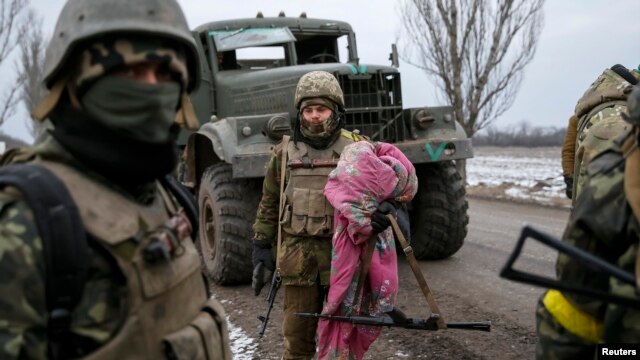Merkel, Hollande to discuss Ukraine amid renewed fighting
| Publisher | Radio Free Europe/Radio Liberty |
| Publication Date | 19 February 2015 |
| Cite as | Radio Free Europe/Radio Liberty, Merkel, Hollande to discuss Ukraine amid renewed fighting, 19 February 2015, available at: https://www.refworld.org/docid/550940e0a4.html [accessed 19 May 2023] |
| Disclaimer | This is not a UNHCR publication. UNHCR is not responsible for, nor does it necessarily endorse, its content. Any views expressed are solely those of the author or publisher and do not necessarily reflect those of UNHCR, the United Nations or its Member States. |
February 19, 2015
By RFE/RL
 Ukrainian servicemen who fought in Debaltseve are seen near Artemivsk on February 19.
Ukrainian servicemen who fought in Debaltseve are seen near Artemivsk on February 19.
German Chancellor Angela Merkel and French President Francois Hollande are due to discuss the situation in eastern Ukraine amid renewed fighting which puts in danger a cease-fire deal brokered by the two leaders last week.
Merkel and Hollande, who have been the key international negotiators in the crisis, are meeting on February 20 in Paris, ahead of an upcoming summit of the Group of 20 (G20 major economies.
On February 19, shelling was reported in the rebel-held city of Donetsk, with artillery fire shaking buildings in the city center.
Ukrainian military spokesman Anatoliy Stelmakh said rebels heavily shelled government-held positions in Shyrokine, near the strategic coastal town of Mariupol, which is under government control.
The latest fighting came after government troops withdrew from the strategic town of Debaltseve following weeks of intense fighting against Russian-backed separatists.
The rebel advance, which defied the cease-fire signed in Minsk on February 12 following marathon negotiations brokered by Germany and France, has been widely condemned.
But Russia and the separatists insist the rebels' actions in Debaltseve did not violate the cease-fire because the town was encircled by rebel forces at the time of the agreement, something Kyiv rejects.
The United States said on February 19 that it was "deeply troubled" by reports of continued fighting.
A White House spokesman said the cease-fire deal was "not a shopping list" and those who signed up to it had to abide by all their commitments.
State Department spokeswoman Jen Psaki said called on Russia and the rebels "to stop their attacks immediately, withdraw heavy weapons, halt the flow of fighters and equipment from Russia into Ukraine, allow the monitors from the Organization for Security and Cooperation in Europe (OSCE) to do their job, and proceed with full implementation of their Minsk commitments."
Psaki said rebels have broken the cease-fire more than 250 times since it went into effect earlier this week.
She warned that, if Russia and the rebels keep violating the deal they signed, "it will result in more costs and isolation."
NATO's top military commander, U.S. Air Force General Philip Breedlove, said he did not think the truce had ever even begun. "It is a cease-fire in name only," Breedlove said during a visit to Kosovo.
Breedlove said that Russia has helped create "a formidable army" in eastern Ukraine, which is well armed and outfitted and has the capacity to escalate hostilities.
Meanwhile, Merkel and Hollande held a new round of phone talks February 19 with the presidents of Ukraine and Russia, Petro Poroshenko and Vladimir Putin.
The French presidency said the leaders denounced the cease-fire breaches and called for "the implementation of the full package of measures agreed in Minsk" including a full cease-fire, withdrawal of heavy weapons, and the release of prisoners.
As Western powers pledged support for the Minsk agreement, a British parliamentary committee said Britain and the EU were "guilty of sleepwalking into this crisis."
In a scathing report released on February 20, the EU Committee of the House of Lords said the EU's relationship with Moscow had long assumed an "optimistic premise" that Russia was on the path to becoming more democratic.
Committee chairman Christopher Tugendhat said, "The lack of robust analytical capacity, in both the UK and the EU, effectively led to a catastrophic misreading of the mood in the run-up to the crisis."
The report said that the EU had not realized the magnitude of Russian hostility to its plans for closer relations with Ukraine.
It also blamed Britain for not being "active or visible enough" in dealing with the situation.
Ukraine meanwhile has called for UN-mandated peacekeepers to enforce the latest cease-fire – a proposal rejected both by Russia and the separatists.
Poroshenko told Ukraine's national and defense council that "the best format would be a police mission from the European Union."
But Russian Foreign Ministry spokesman Aleksandr Lukashevich said on February 19 that the truce agreement signed in Minsk last week should remain the basis for the conflict's resolution.
And Denis Pushilin, a rebel leader in Donetsk region, was quoted by Russian media as saying the presence of peacekeepers would "violate" the Minsk agreement.
Under the Minsk deal, meant to quell a conflict that has killed more than 5,600 people since April 2014, both sides were due to lay down their arms on February 15 and begin withdrawing heavy armor from the front lines two days later.
The cease-fire has been broadly observed in eastern Ukraine and some heavy weaponry is said to have been withdrawn by both sides.
Based on reporting by Reuters, AP, AFP, dpa, BBC, and independent.co.uk
Link to original story on RFE/RL website
